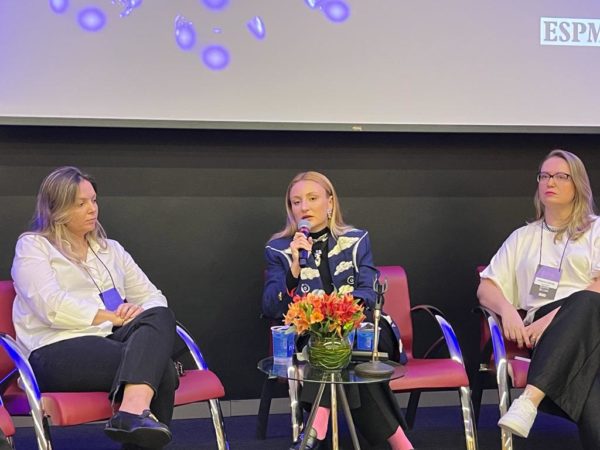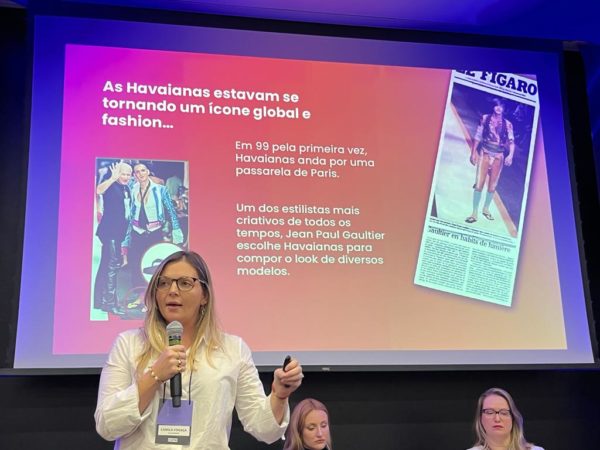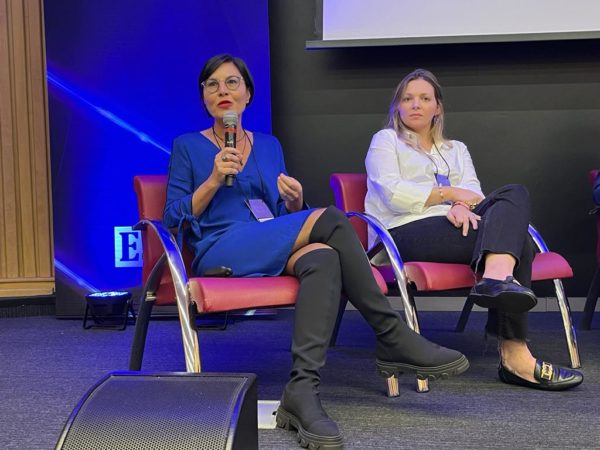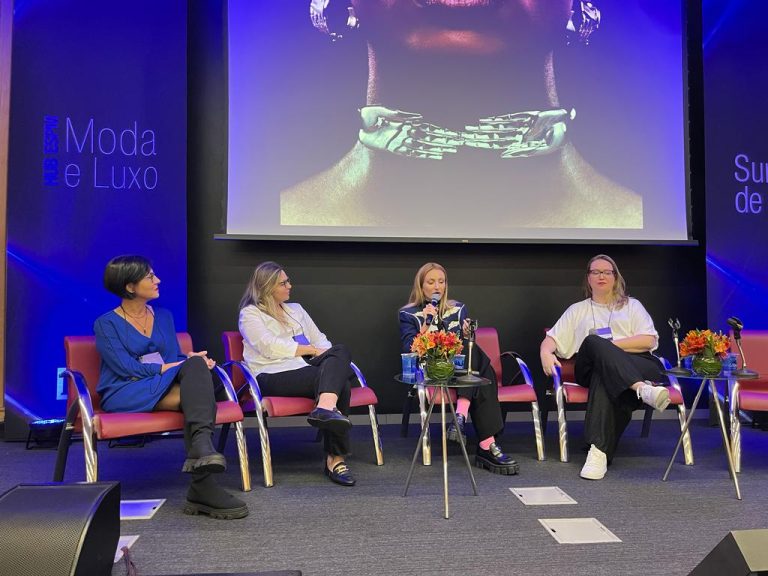São Paulo – Boldness, originality, and luxury paved the way for the jewelry brand Paola Vilas in the international market. The Brazilian flag and the country’s football success helped Havaianas sandals sales abroad take off. These different paths taken by Brazilian fashion companies to export were the subject of a lecture held this Wednesday (16) at Escola Superior de Propaganda e Marketing (ESPM) college in São Paulo, in which the peculiarities of the Arab market in the segment were also presented.
The event was part of the ESPM Fashion Meeting – Opportunities in the Future of Fashion, hosted by the university’s Fashion and Luxury Hub. The founder and creative director of her namesake jewelry brand, Paola Vilas; the fashion export specialist, Camila Fogaça; the Marketing & Content director of the Arab Brazilian Chamber of Commerce (ABCC), Silvana Gomes, and the mediator, professor Priscila Sastre, spoke about their experiences in fashion products exports.
Paola Vilas
“The surreality of Paola Vilas’ jewelry redefines femininity,” wrote Wallpaper magazine about Paola Vilas’ work. “[The magazine] defined in a few words what I’ve always sought,” said Vilas at the event. Her brand was born export-bound, and in her studio in Rio seven years ago, she was already selling to other countries. She took the opposite path and got known outside first. Today she lives in São Paulo and has two stores in the city and a webshop delivering worldwide. Her focus now is on the domestic market.

“I think early on I wasn’t so aware, but I always wanted to keep my product true, resonating with my truth, moving me, and touching me in a special place,” she said.
The pieces, according to Vilas, are wearable sculptures. “They are conversation starters and open portals of connection between people,” she stated.
Vilas launched her brand at age 23; today, at 30, she says creating a visual universe for a brand, its alphabet, and its language is necessary to stand out. “To just have a product you believe in, you think it is exceptional, you’ve already tested, and people have connected with, that is provocative, is not enough. It is necessary to have an image to support that product, to add to it. Creating a brand today is creating a visual universe; it goes far beyond the product,” she said.
Regarding the foreign market, Vilas declared it is fundamental to remain true to herself and not try to please everyone. “And we need to stop regarding being in Brazil as being isolated from the world. We are in São Paulo; everything is possible,” said the jeweler.
She became known through Instagram, wrote an editorial for Vogue Italia before writing for Vogue Brasil, and three of her pieces went viral after appearing on inspirational profiles. “Boldness is also essential; you need to be a little crazy; otherwise, you won’t do anything,” she stated.
Today, her pieces are in multi-brand stores such as Selfridges in London, and Net-a-Porter, an international luxury brand. She has already sold pieces to Hong Kong, Japan, the Philippines, and Ukraine, among other countries, and had a Qatari client in London.
Since then, Vilas has seen domestic demand grow and, in 2019, decided to move to São Paulo and dedicate herself more to the domestic market. “The downside of exporting is that you don’t know who you’re selling to, how the message arrives. I shifted the strategy to serve the domestic market to mature this universe, language, products, and myself as a person,” she said.
The brand already had 86% of its products exported. Now, she has been doing international collaborations with other brands.
Havaianas
Camila Fogaça worked for ten years in the international department of Havaianas and accompanied the brand’s internationalization process. She said Havaianas sandals with the Brazilian flag were the starting point for the process.
The stock of Havaianas with the Brazilian flag after the 1998 World Cup, in which the national team lost the final to host country France, became the exported product. “The brand took advantage of the moment when Brazil was on the rise, not only for football, but music, beaches; it was an aspirational country, and the product sold well,” she said.

“Taking the country’s DNA into the product, Havaianas have become an object of desire abroad, and in Brazil, an object of pride,” she declared.
Collaborations with stylists, Havaianas on the catwalks, presence in multi-brand stores such as Harrods and Macy’s, and celebrities wearing flip-flops contributed to the brand’s globalization.
The brand knew how to reinvent itself and today has over 5,000 models of footwear, not just flip-flops, as well as clothing and accessories, such as bags and sunglasses. “This brings more repertoire of occasions to use, and consequently a longer journey of consumption,” said Camila.
The countries where Havaianas have adapted the most are those less formal and with greater identification of the summer culture and where summer is present for a longer time, such as the Philippines, Thailand, Australia, and New Zealand. “Consumers often don’t even know where Brazil is on a map, but they know the music, culture, beach, samba. In Europe, this is very common. People wear Havaianas for three months a year in the summer. Despite everything, the lightness of the summer spirit is aspirational, desired,” she said.
The tip for exporting, according to Camila, is “not just to export an iconic product, but also the lifestyle, the mood with a smile and the lightness of living the Brazilian life.”
Arab Brazilian Chamber
The Marketing & Content director of the ABCC, Silvana Gomes, said early in her career she worked with footwear in Rio Grande do Sul and later in São Paulo, in the cosmetics industry. For about 30 years, she has been working with international trade.

An ABCC director since 2021, she presented the organization’s services and spoke a little about the fashion market in Arab countries.
“In addition to the Gulf, there are other regions we cover in North Africa with potential markets, including for luxury, such as Morocco, which has been emerging in this market, as well as Egypt, which has entered the tourism scene in Brazil,” she said. She mentioned Tunisia and Mauritania could be other prospective luxury destinations.
“The Arab market is made up of people who like luxury, take care of their image, like to preserve family values, and cherish long-term relationships,” she said.
Silvana also spoke about halal fashion. “These are more modest pieces under the principles of sharia. Women prefer fluid fabrics, and, in general, the sustainability of products is highly valued,” she said.
Translated by Elúsio Brasileiro




